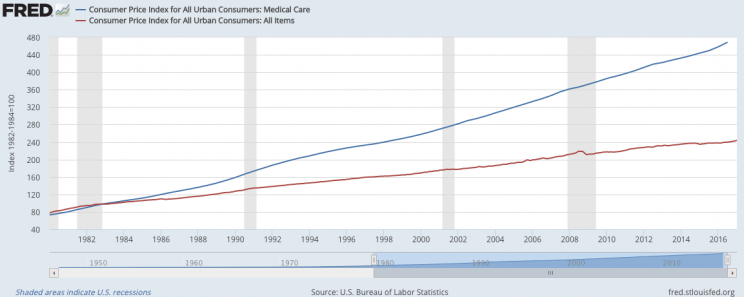The real healthcare problems Republicans need to fix
The Republican narrative on healthcare reform casts Obamacare as the problem: Costs supposedly soared after the law passed in 2010, insurers bailed out of markets where they couldn’t make a profit, innocent Americans suddenly got fined if they didn’t buy expensive healthcare they didn’t feel they needed.
Obamacare certainly has its flaws, but the wrangling over a GOP replacement plan obscures something much more important—the US healthcare system was failing long before Democrats passed the Affordable Care Act in 2010. That’s the whole reason Obamacare came into being—too many Americans were unable to get care, or paid so much that it ravaged their finances.

As Republicans struggle to pass the American Health Care Act—their Obamacare replacement plan—the myth is that they need to fix what Obamacare broke. The reality is that they need to address fundamental problems in the US healthcare system that existed way before Obamacare, including skyrocketing costs, opaque pricing, overuse of care by some doctors and patients, obesity and diabetes epidemics, and especially the difficulties faced by working-age adults who aren’t covered by an employer plan. Simply undoing Obamacare will leave all those problems intact and make some of them worse.
If there’s one single underlying problem, it’s probably the cost of medical care, which has been rising far faster than overall inflation since the mid-1980s, as this chart shows:

It’s probably fair to say the Affordable Care Act is misnamed, because it did little to arrest the skyrocketing cost of healthcare. But it didn’t cause the problem either, as many people seem to think. If anything, it made more Americans aware of how expensive healthcare can be, by bringing them into the paying system where they have to deal with deductibles, co-pays and unexpected costs for things like using out-of-network providers.
The ACA undoubtedly did some good, compared with the situation before it went into effect. David Blumenthal and Sara Collins of the Commonwealth Fund recently pointed out that before 2010, insurance premiums for people without employer- or government-provided insurance were rising more than 10% per year, on average. Insurance companies were allowed to deny coverage for pre-existing conditions, effectively rendering coverage meaningless. In the three years before 2010, an estimated 9 million people who tried to buy a so-called individual plan were either turned down flat, charged more because of a health problem, or denied coverage for a pre-existing condition.
From 2001 to 2010, the number of working-age, uninsured Americans rose from 38 million to 52 million, which was 28% of the working-age population. The deep recession that started in 2007 was particularly brutal, since many of the 9 million people who lost their jobs also lost insurance coverage—at the same time their income plummeted, making it hard or impossible to buy coverage on their own.
A 2009 study published in the Journal of the American Medical Association found that 62% of personal-bankruptcy filings were caused by unmanageable medical costs. A Harvard study published the same year found that 45,000 Americans died every year simply because they lacked health insurance and couldn’t get reasonable access to care. That was hardly a healthcare system to be proud of, and the millions of people falling through the cracks generated the political pressure that led to the ACA passing in 2010, when similar efforts had failed going all the way back to the early 1980s.
Obamacare has made some important improvements. Nobody can be denied coverage anymore, because the notorious exclusion for pre-existing conditions is now banned. Federal subsidies make coverage far more affordable for low-income Americans. The uninsured rated plunged starting in 2014 for the first time in years, as this chart shows:

Problems obviously remain, including rising costs, especially for people who don’t qualify for federal subsidies or have access to employer-provided insurance. But Obamacare made a dent in longstanding problems that existed before it went into effect. If Republicans ignore the historical context, their Obamacare replacement plan could restore the awful status quo circa 2009.
The GOP plan would knock 24 million Americans off insurance by 2024, mainly through Medicaid cutbacks, according to the Congressional Budget Office. That would raise the number of uninsured roughly to where it was before the ACA, and most likely revive all the attendant problems—medical bankruptcies, deaths caused by lack of care, the use of costly emergency rooms for treatment that ought to be done elsewhere. Federal subsidies would generally decline as well under the GOP plan, which would save taxpayers money but cause more hardship for people struggling to buy insurance.
Some people probably think the healthcare system was working well enough before the ACA, which was sort of true for the 50% of Americans lucky enough to be covered by an employer plan. But those left out finally mustered the political muscle to change the law—and they will again if Congress reverts to a system that was pretty lousy to start with.
Read more:
Confidential tip line: rickjnewman@yahoo.com
Rick Newman is the author of four books, including Rebounders: How Winners Pivot from Setback to Success. Follow him on Twitter: @rickjnewman

 Yahoo Finance
Yahoo Finance 
